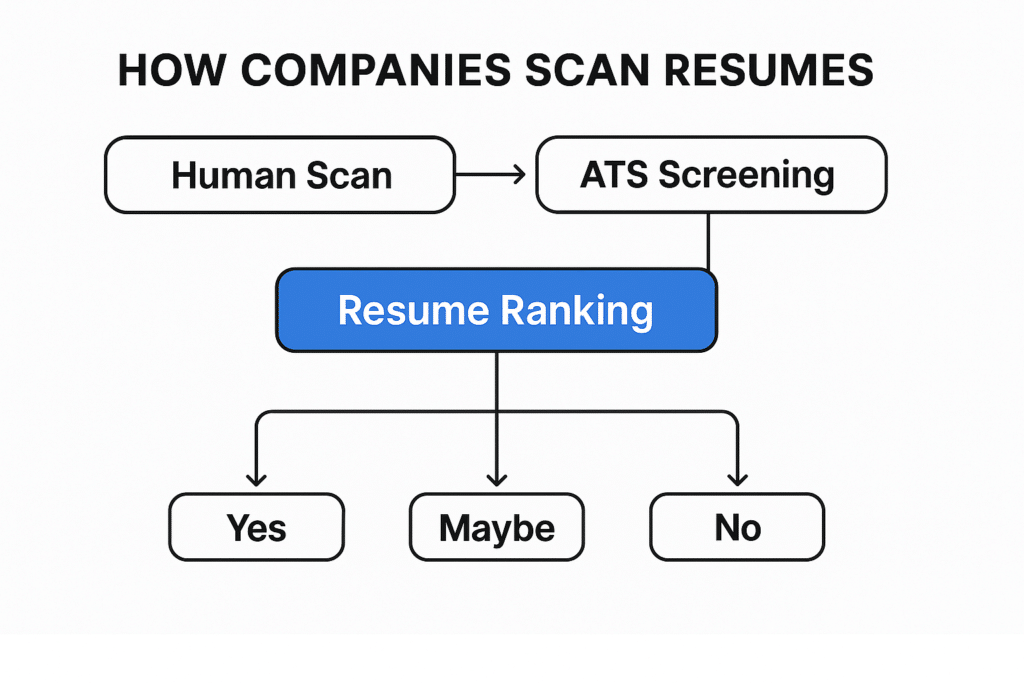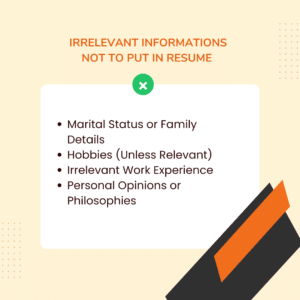

A resume is a marketing tool that tells employers about you. It lists your education, work experience, skills and achievements. The goal is to show how you can contribute to the success of the company you’re applying to. We will discuss what you can do to avoid these red flags in your resume.
Key Parts of a Resume
A good resume helps you stand out and capture the attention of employers. It should be easy to read and show why you’re perfect for your desired job.
Nowadays, companies use humans and AI to detect resumes, it’s important to ensure your resume is optimized for both. These advanced tools pass or fail the resume in no time. If you also don’t want to lose your resume among a hundred false resumes, don’t ignore these red flags in your resume:

Recruiters begin by manually scanning resumes for specific keywords, qualifications and relevant experience. This initial scan helps them identify candidates with basic requirements that match the job posting.
The objective of the initial step is to categorise candidates into three scenarios:
Yes, Maybe and No.
Candidates whose resumes fall into the Yes category undergo a more detailed review. During this stage, recruiters assess the candidates’ Education, Skills and Experience.
This detailed review helps recruiters further narrow down the candidates and select the best-suited for the position.
Recruiters use the Applicant Tracking System (ATS) to ease the recruitment process. These systems automate resume screening, ranking and storage to ease the recruitment process. ATS software scans resumes for keywords, skills and qualifications that align with the job description.
ATS are widely used across industries, including Fortune 500 companies. It’s important to take care of human recruiters and ATS as well.
Don’t ignore these silly mistakes in your resume if you want to land your dream job:
Spelling and grammatical errors are the major red flags in a resume. These red flags in a resume are perceived as indicators of lower mental abilities (32.2%), conscientiousness(12.1%) and interpersonal skills (9.%). As a result, they lower your chances of resume selection by 18.5%.
A CareerBuilder survey found that 58% of resumes contain typos that overshadow even strong qualifications. Recruiters often interpret these errors as a lack of attention to detail or professionalism.
Additionally, grammar and spelling mistakes can signal poor communication skills, which is critical for many roles. Due to the presence of spell-check tools, submitting a resume with errors suggests a lack of attention to detail and carelessness.
The rise of AI tools has changed how job seekers write their resumes. Although AI simplifies the process, relying heavily on AI-generated content can be a red flag in a resume for hiring managers.
AI often produces generic templates and phrases. These templates don’t explain how your experience fits the specific job requirements. Recruiters prefer resumes in which candidates mention the company’s needs and amend their application accordingly.
A generic resume suggests that candidates haven’t invested the effort to research the company. Many companies use ATS to filter resumes before they reach human recruiters. While AI tools write generic content with keyword stuffing or unnatural phrasing, ATS systems can easily detect and flag them as spam.
Recruiters value authenticity and honesty in the job application. If your resume is entirely generated by a machine, it raises questions about the candidate’s integrity and authenticity. A resume should tell a story of your career, achievements and challenges you solved. These AI tools struggle to capture this part and reduce the value of your resume.
When making a resume, it’s important to use clear and conventional job titles and section names. Unusual or unconventional titles confuse recruiters and ATS.
Recruiters often scan resumes quickly by focusing on key sections like Work Experience, Education and Skills. If these sections have different names like Professional Journey or Learning Part, it makes the review process hard and hinders your qualifications from being recognized.
Consistency in formatting and naming helps your achievements stand out.
Many companies use ATS to filter and organize resumes before they are seen by human eyes. These systems rely on keywords and standard formatting to categorise and rank applicants.
ATS might not recognize unusual section names or job titles. For example, if you write your work experience as Career Highlights, ATS might not properly index.
Using unusual titles also impacts how professional you appear. Creativity is important in many fields, but your resume is not the right place to show it.
Employers want candidates who can communicate effectively and follow established norms in their industry. Unusual titles might suggest that you are not familiar with industry standards or are trying too hard to stand out.
To overcome it, stick to industry standards..
Example of Effective Section Names
Here’s an example of how you might structure your resume with clear and conventional section names:

A well-designed resume is crucial for making a positive impression on hiring managers. Poor layout and design can lead to red flags in a resume, even if you have excellent qualifications.
Here’s why layout matters and how you can improve it:
Recruiters often spend only a few seconds scanning a resume before deciding whether to read further. A messy or disorganized layout immediately creates a negative impression. On the other hand, a clean and well-structured resume signals professionalism and attention to detail.
A poorly formatted resume is difficult to read, and recruiters miss important information about your skills and experiences. It also causes problems with ATS since inconsistent formatting confuses the machine.
A resume with inconsistent fonts, margins or bullet points suggests a lack of professionalism or carelessness.
Follow these guidelines for consistency and clarity:
Example of Effective Resume Layout
Here’s a simple example of how you might structure your resume:

Including irrelevant information on your resume hides your qualifications. It makes it harder for hiring managers to focus on your relevant skills and experiences.
Recruiters typically have limited time to review each resume. If your resume includes information that isn’t related to the job, it takes attention away from key qualifications and achievements.
Employers look for candidates who have taken the time to understand the job requirements and tailor their application. Including irrelevant information suggests that you haven’t made an effort to match your skills with the position.
A resume with irrelevant information can give a negative impression.
Examples of Irrelevant Information

Here are some examples of information that is typically considered irrelevant on a resume:
Your resume is your first impression on employers, so make it count! Avoid common red flags in a resume, like spelling errors, poor formatting, and irrelevant details, to stand out. Keep it clear, professional and related to your job. Invest your time in refining your resume to make a strong impact. Highlight your strengths without errors. A polished resume opens the door to new opportunities, so start perfecting yours now!
u003cstrongu003eOn a resume, which red flags appear most often?u003c/strongu003e
Typical warning signs include odd employment gaps, frequent job hopping, unclear job descriptions, spelling and language mistakes, and lack of career advancement. These could cause companies to question the professionalism and dependability of a candidate.
u003cstrongu003eHow might employment gaps influence my chances of landing a job?u003c/strongu003e
Companies could see inexplicable gaps as evidence of a lack of dedication or inconsistency. But if you approach them honestly—that is, if you explain time spent for personal growth, education, or care—you can help to allay worries.
u003cstrongu003eIs job hopping definitely cause for concern?u003c/strongu003e
Frequent temporary employment could point to instability, but it’s essential to explain in your cover letter or resume whether you have legitimate reasons—such as contract work, company closures, or career development.
u003cstrongu003eCould grammatical and spelling errors ruin my job application?u003c/strongu003e
Yes, precisely, Grammar and spelling mistakes point to a lack of attention to detail, which would cause recruiting officials to doubt your professionalism and ability to communicate. Proofread always before turning it in.
u003cstrongu003eOn a resume, how much weight do job descriptions carry?u003c/strongu003e
Response: rather vital! Employers find it challenging to grasp your experience and qualifications from vague job descriptions. Emphasize duties and successes using simple, short bullets.
u003cstrongu003eShould I mention every job I have ever held?u003c/strongu003e
Response: Not absolutely, either. Emphasize pertinent experience that is consistent with the position you are seeking. Having too many unconnected occupations can give your résumé an unfocused impression.
u003cstrongu003eShould I stretch my experience or ability?u003c/strongu003e
Inflating your credentials could backfire. Many times, companies check credentials; dishonesty could cause disqualification or even termination down the road.
u003cstrongu003eIf I have little work experience, what should I do?u003c/strongu003e
Highlight from coursework, voluntary work, freelancing projects, or internships transferrable abilities. Focusing on soft talents and successes might help offset the lack of formal experience.
u003cstrongu003eCould a poorly written CV affect my chances for employment?u003c/strongu003e
Correct response: Indeed! An uneven or messy layout makes reading your resume difficult. To guarantee readability, use a neat design, professional typefaces, and appropriate space.
u003cstrongu003eHow might I make my resume stand out favorably?u003c/strongu003e
Use keywords from the job description to customize it for every position, measure successes, and emphasize impact over mere duties. Additionally, improving your application is a well-written cover letter.
Schedule a Call and Get a 7-Day Free Trial
No Credit Card Required
Schedule a Call and Get a 7-Day Free Trial
No Credit Card Required
What’s Included in the Trial:
✓7 days of work across six key technologies
✓Access to premium tools needed for your projects
✓No questions asked if you choose not to continue afterward
✓Transparent communication with daily progress updates
✓Fast turnaround to help you meet tight deadlines
✓ Opportunity to test our workflow and collaboration process firsthand
Stellites partners with digital agencies as a white-label provider for their talent and development needs. We offer top-tier professionals in Digital Marketing, SEO, Paid Advertising, as well as WordPress, Shopify, and other platforms—available on a full-time or pay-as-you-go basis.
At Stellites, our white-label development services are designed to deliver 100% pixel-perfect and technically complex projects within competitive timelines, allowing your agency to scale effortlessly and impress your clients.
Stellites partners with digital agencies as a white-label provider for their talent and development needs. We offer top-tier professionals in Digital Marketing, SEO, Paid Advertising, as well as WordPress, Shopify, and other platforms – available on a full-time or pay-as-you-go basis.
At Stellites, our white-label development services are designed to deliver 100% pixel-perfect and technically complex projects within competitive timelines, allowing your agency to scale effortlessly and impress your clients.
COPYRIGHT © 2025 Stellites Technologies. All Rights Reserved.
Get 15% Discount on all product
Enter your email to receive your exclusive coupon and start saving on your next purchase. Don’t miss out on special deals and updates!